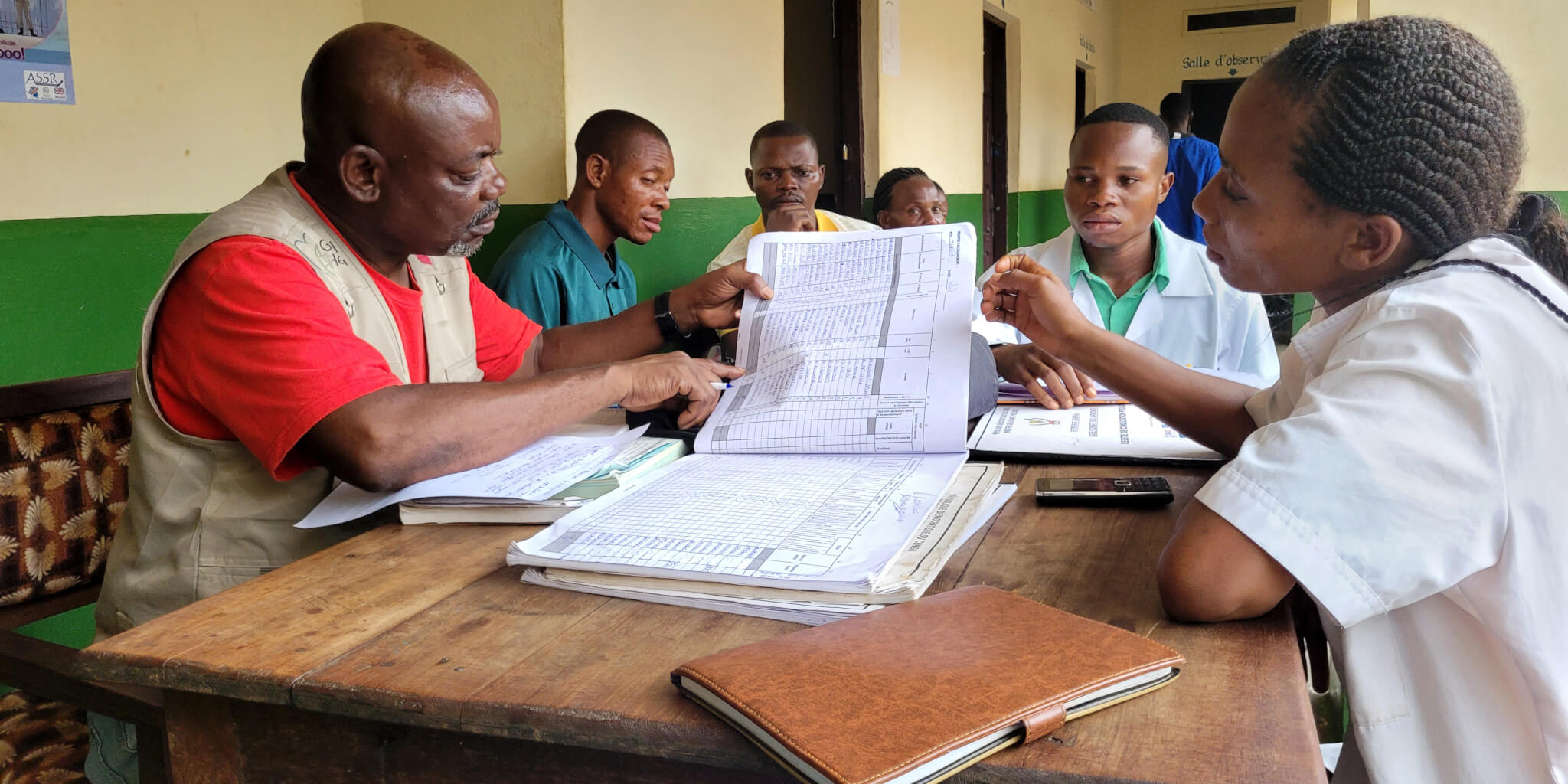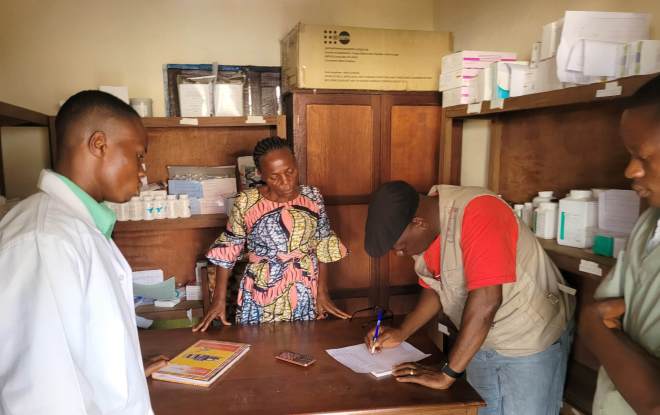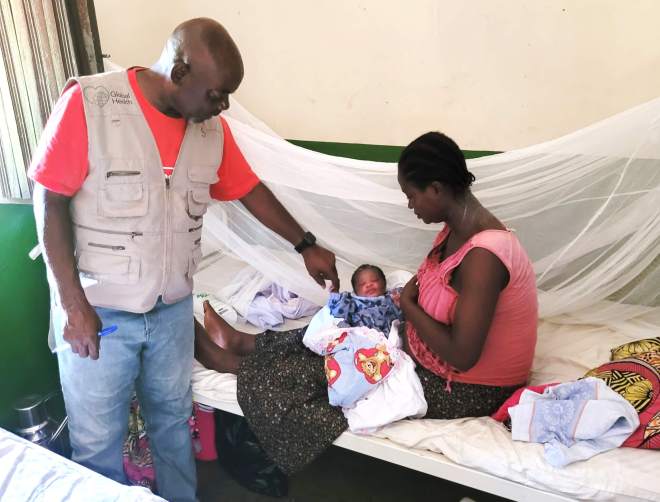
Dikete (left) reviews the patient records and Maternal, Newborn, Child Health data recorded by staff of the Nganza Health Center Maternity Ward. DRC. PHOTO: CENTRAL CONGO UMC HEALTH BOARD
A health center attacked and looted in Central Congo makes a comeback after several years of intensive work on facilities, equipment, pharmacy supplies and training for personnel by the Central Congo Health Board, supported by Global Ministries’ Global Health team.
By Christie R. House
June 15, 2022 | ATLANTA
Residents of Nganza, Democratic Republic of the Congo, have endured heartbreak and hardship since 2017. This village, southwest of Kananga in the Kasai province, became a major flashpoint for what villagers there call a war. In March that year, clashes between security forces and militia erupted into full-scale violence for nearly a week, with many civilian casualties. People fled into the bush to escape the fighting, and some stayed there for months.
The Central Congo United Methodist Episcopal Area has a health center in Nganza, which was attacked and looted. Though it remained open, its condition and lack of vital equipment and supplies deterred returning residents from using its services.
“For more than four years, this health facility experienced a drop in patients, never seen before in its history,” confirmed the Central Congo Health Board Coordinator, Gabriel Dikete. “Especially maternity services, such as the number of deliveries, prenatal consultations and postnatal consultations.”
In 2019, the Central Congo Health Board and Global Ministries began a rehabilitation project, not just for the Nganza Health Center, but for a total of 20 such centers in other remote areas of the episcopal area too. A series of grants over the last four years has revitalized small UMC health centers across the region. The grants target key areas of health care: strengthening health systems; community outreach and training; facility rehabilitation and the drilling of boreholes; maternal, newborn and child health; malaria prevention, diagnosis and treatment; and COVID prevention and management. At Nganza, the transformation has brought about a rebirth of the maternity unit.
Pride in offering a comfortable place
During its rehabilitation, the maternity ward at Nganza Health Center received new equipment, such as an ultrasound device, furniture, medicines, cleaning supplies and bed nets, all of which greatly improved its services to patients. Dikete, the Health Board Coordinator, also organized regular staff training to update medical and administrative staff on procedures and record keeping.

PHOTO: CENTRAL CONGO UMC HEALTH BOARD
The new health structure adopted at the health center has documented an increase in patients from 1,525 in 2019 to 3,065 patients in 2021. The number of deliveries per month was tracked from an average of seven per month in 2019 to an average of 25 per month in 2021.
Mrs. Berthe Kalanga, the director of the maternity ward, has also witnessed an increase in patient confidence in the health center itself.
“I am extremely happy to see that the Nganza Health Center has regained the confidence of its population after its rehabilitation. We currently receive many pregnant women for prenatal consultation activities; many of them come back to give birth in our facility. Our services are very well organized, and we no longer lack medicines and nets to fight malaria. We are working in very pleasant conditions,” Kalanga said.
Their records also show that they’ve gone more than seven months without registering a maternal death. “We are motivated to do our work properly with love; it is truly a joy,” she noted. She also thanked the Central Congo Episcopal Region Health Board for its efforts to make the health structure viable and credible.
The miracle of new life
One of the new mothers who turned to Nganza Health Center for help with pregnancy and childbirth is Mrs. Rose. She and her husband have conceived six times, but two were stillbirths and none of the others survived to delivery. She was resigned to never having children.

“I couldn’t believe that one day I was going to give birth to a living child, I really lost hope,” she reported to the Nganza health team. “My sister said the deaths of these children were linked to a traditional cause. She wanted me to see a traditional healer for this baby, but my husband, a primary teacher, refused. Then my neighbor told me that the Methodist Nganza Health Center offers good prenatal care services.
“My husband and I went to the health center together and I started prenatal care. I carefully followed all the instructions and lessons given during the education sessions. I delivered a baby girl without complications, and we are all healthy together with my baby.”
Rose, a member of a United Methodist Church, now serves as a health promoter in her village. She encourages pregnant women to seek help from the professional medical staff at Nganza Health Center.
Dikete makes monthly visits to Nganza and to the other Methodist health centers in his region. He’s observed that the health centers in Nganza, Kananga II, and Diengenga, as well as the Wembo Nyama Hospital, have made great strides in the last two years. According to him, patient care has improved and almost all the registers are currently updated and correct.
He also noted the difficulty of many of the centers to operate well at night because of a lack of electricity and good lighting. He’s already planning the next project – acquiring good solar lighting systems – stay tuned.
The worldwide work of Global Health can be supported through the Advance with a gift to Abundant Health, Advance # 3021770.
Christie R. House is a consultant editor and writer with Global Ministries and UMCOR.

